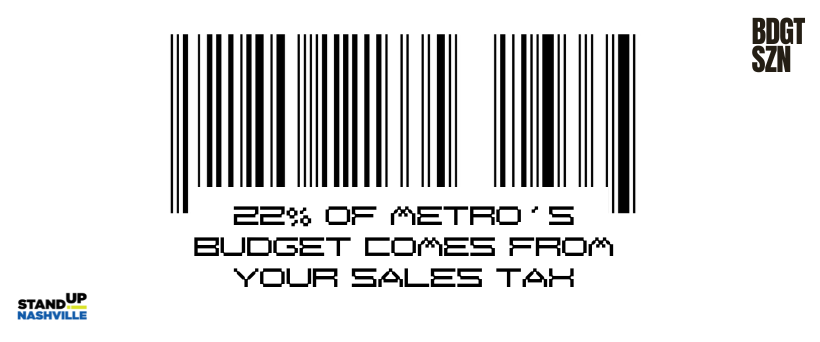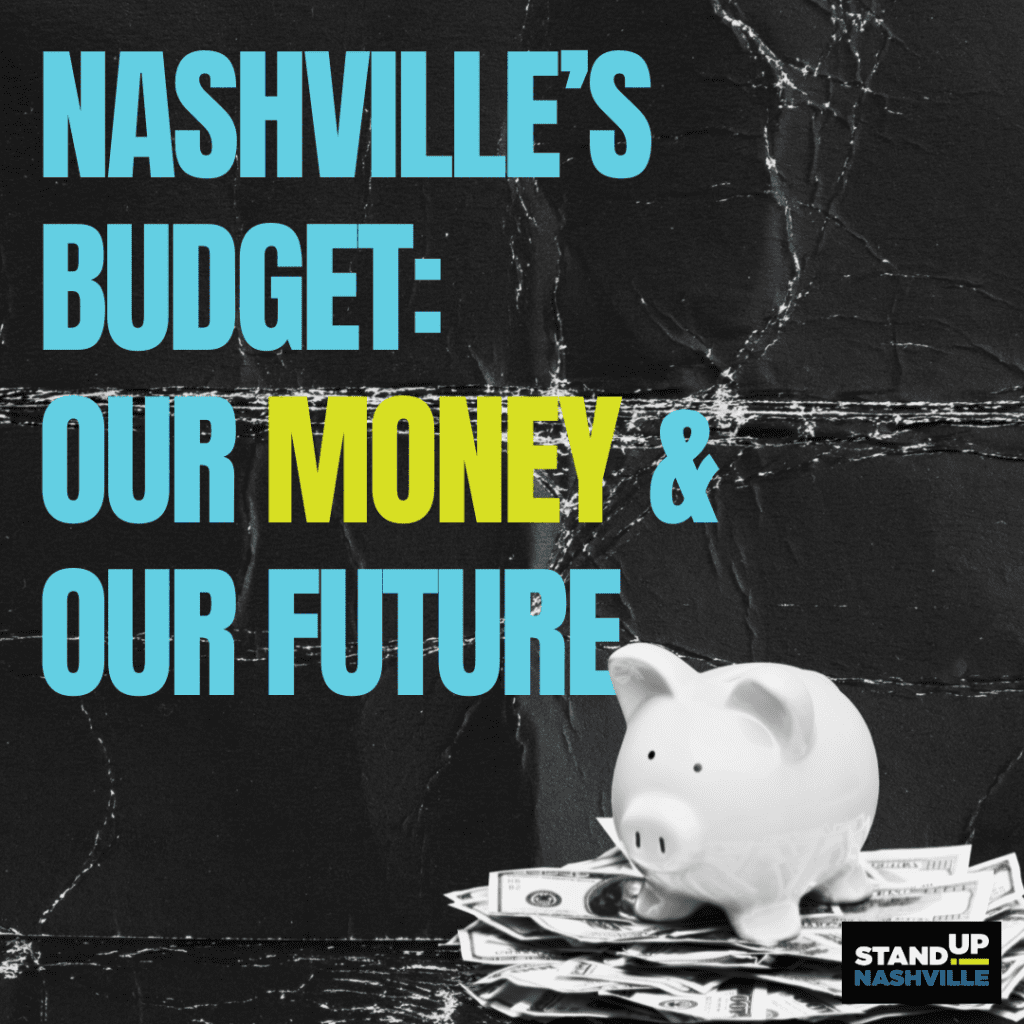The previous issue explained how tax increases are political, outlined the city’s financial reality, and clarified the difference in raising taxes versus adjusting taxes. Now, we’ll dig into tax revenue sources, reappraisals, and how state preemption limits Metro Nashville’s revenue options. Haters.
Why focus on property taxes instead of other revenue sources?
Let’s start with a word and phrase that you’ll see more than a few times: regressive, and regressive tax. Regardless of the form, they refer to a type of tax or tax rate that disproportionately impacts and burdens people with lower incomes. We most often see this in sales taxes: the taxes charged on certain types of goods and services. For example, there are two families. One earns an annual income of $50,000 and the other earns $100,000 annually. If both families spend $100 on groceries, they may both pay the same $7 in taxes. However, to the family making $50,000, that $7 is twice as much as a percentage of their income. So, the sales tax is regressive because it places a greater burden on lower-income taxpayers.
Nashville receives a portion of the state sales tax – 2.25% to be exact. It can only be raised to 2.75% per the State’s cap. Plus, increases to sales tax must be submitted as a local referendum for voters to decide.
In contrast to regressive taxes, progressive taxes increase as taxable income increases. Although property taxes are still considered regressive, they are more progressive than sales tax because the tax burden is distributed more equitably across income levels. Property taxes are the most progressive source of tax revenue for Metro Nashville and Davidson County because commercial and property taxes are taxed higher than residential and farm property. As a result, businesses and corporations pay more in taxes than regular homeowners. Only 25% of residential and farm property values are taxed, in comparison to 40% of commercial and industrial property values that are taxed. On top of that, commercial and industrial owners are taxed at 30% for property that’s not affixed to the land – think equipment, furniture, tools and computers, etc.
What about other more progressive and equitable forms of taxation? By and large, they are preempted by the State. Nashville cannot tax corporations’ income. Forty-three states and the District of Columbia collect revenue from individual income taxes – Tennessee is not one of them. While not paying income tax is a perk for people moving into Tennessee from states with an income tax, it’s obvious that the additional revenue could benefit local residents and Tennesseans. Too bad the state legislature preemptively banned it via the state constitution in 2014. As a result, local municipalities cannot implement their own income tax. Major haters.
Property taxes are the best tool for Metro to receive more revenue for the vital public services, programs, initiatives, and operations to meet the needs of our communities. After all, given the options of where they rank on an equity scale, and what isn’t banned by the state, property taxes are “it.” Plus, the mayor and council tend to lean more to the concerns of the community and constituents when property taxes are up for discussion.


How reappraisals change property taxes
First things first, what is a reappraisal when it comes to taxes? In this case, a property reappraisal is a reassessment of the value of your property to see how much it has increased based on the market, or in rare circumstances, decreased. It includes residential, farm, commercial, and industrial properties. Davidson County’s reappraisals occur on a four-year cycle, while other Tennessee counties operate on four, five, or six-year cycles. Our last reappraisal was in 2021, and the next one will be in 2025.
Once reappraised, the new property value will be the new number that is taxed at a percentage dependent upon its use: 25% for residential and farm, and 40% for commercial and industrial, along with an additional 30% on non-affixed commercial property. If your home was worth $100,000 4 years ago and is now worth $300,000, your property tax will be calculated based on the new value.
Tennessee is unique in that state law has a revenue neutral requirement for property reappraisals. Supporters of that law say it is to prevent local governments from getting new revenue simply because of rising property values. Local governments are required to set what is called the “certified tax rate” to complete the reappraisal process.
Hypothetically, if the reappraisal found a countywide increase in property values of 20%, the overall revenue must stay the same, resulting in the certified property tax rate automatically decreasing by 20%. However, the state only prohibits revenues from increasing automatically – it does not actually directly prohibit Metro from changing the tax rate. The Mayor and Council then have to consider how much to adjust the tax rate in the annual budget process to meet the needs of the city. Property values typically increase with population growth, which means demand for city services – and their cost – will have increased as well.
Raising taxes tends to be unpopular, which is why the mayor and council try to avoid it. In fact, they typically wait until a reappraisal year to adjust the property tax because the reappraisal process is already going to change the rate. This might seem sneaky, but it also gives homeowners a better expectation that their property taxes will only change every four years.
What does reappraisal mean for the budget?
We’ve already established that tax rates usually only change in reappraisal years. So, large amounts of new revenues for the budget are only really available every four years – next up: 2025. The exception to this is when there are big increases in sales tax for some reason. It is typically during reappraisal years that a mayor will plan their most ambitious and costly new programs. Unfortunately, those revenues also get eaten up by inflation and new costs. As a result, the political window for progressive programs in the budget that address meaningful community needs, i.e., affordable housing, can be limited by lack of revenues. This is why it is important that we as a city create new revenues.
Adjusting – not raising – taxes
Most people assume intuitively that economic growth means more public resources for community needs. But we have shown that the revenue neutral requirement prevents revenues from keeping pace with public needs and city growth. Maintenance costs, public services, staffing, and operations costs increase each year due to inflation, but we’re barred from leveling the field.
How can a city collect more revenue but actually say it lowered the tax rate? In 2017, the property tax rate dropped from $4.516 to $3.155, a 30% decrease. Mayor Barry and Council chose to keep the revenue neutral rate, causing the well documented future budget issues. But, if they had done it correctly and adjusted the rate by $0.50 to $3.155, they would have brought in new revenue, but the tax rate itself would still be lower than the previous year. It is the rising property values that are the source of the new revenues. It’s complicated, we know!
Consider this, the property tax rate when Metro Nashville consolidated with Davidson County in 1963 was $5.70. Today, it is at a historic low of $3.25. Property values are considerably higher and we have a lot more sales tax revenues, but the city has also grown in population, that’s why the budget is a lot bigger, but also seems stretched each year.
Residents are fed up with public funds being given away to special interests like the Titans stadium. These actions only further the distrust of elected officials and appropriate use of public resources. If the options are stadiums and corporate handouts vs. your local school, sidewalks, and affordable housing – you’re probably most likely to side with the latter. While there has been a shift in elected officials prioritizing what the overwhelming majority of people want, SUN continues to pay attention to how public resources get used. With you and other community members with us, we can and must hold decision makers accountable. Only through organizing community action and marshaling public resources can we deliver on community needs.
Each of us must understand what adjusting property taxes represents:
- Adjusting the property tax rate is required by state law in reappraisal years and people’s tax bills will change. The question is, “What public services do we want and need as a city, and what are we willing to pay for them?”
- We have to organize to ensure the priority is to fund critical public services that benefit the community, instead of forcing taxpayers to foot the bill for stadiums and corporate giveaways.
Thanks for reading and sharing feedback as we challenge the status quo when it comes to taxes. We’re determined to explore the options that ensure a city where the working class, Black people, and communities of color will benefit too.
Remember, you can always let us know your thoughts, aha moments, and the dots this series is connecting for you.







